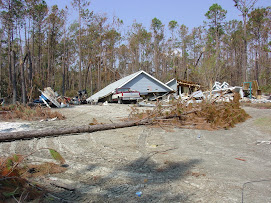Welp folks, them crooks at Allstate can run but they can't hide and they is now before the Florida State Senate tryin' to explain how they cook the books. From readin' the story and comments after the story them boys best find a new shade of lipstick to slather on that Pig in the Poke they is tryin' to sell, 'cause from the sound of it them Florida Senators ain't buyin' in to the BS. Hats off to our own Sop who pegged BS weather models as one way them crooks fleece the public. Them posts, includin' the first one on this here blog are found here and here.
Allstate tells why it didn't drop rates
BY BEATRICE E. GARCIA
As a special Senate committee began two days of hearings with state insurance officials and insurance company executives, Allstate Floridian's chief executive explained that the company didn't pass on savings from its reinsurance purchases directly to policyholders because Allstate's rates already were inadequate.
Joseph Richardson, who was appointed to his current position last March, explained that the 2004 and 2005 storms wiped out the company's surplus. While capital was replenished by its parent company, the Florida-based insurer sought to rebuild that capital through higher rates.
A massive insurance reform bill passed last January required insurers to pass on savings achieved by buying less-expensive back-up insurance from the state's catastrophe fund.
The purpose of this special committee's investigation is to determine why rates haven't fallen as expected.
The bill expanded the state's catastrophe fund to provide less expensive backup insurance for insurance. Insurers who bought this reinsurance were required to pass on the savings to policyholders in the form of lower rates. Only 68 percent of the 118 home insurers in the state have lowered rates so far.
Senators spent more than four hours questioning Allstate officials about how the company factored profits into its rates, how it used the computer models to determine how much of a rate increase it needed, and how much and what it paid for reinsurance in recent years.
The panel asked again and again why Allstate bought insurance and asked for a large rate increase last year, even though it has dropped about half of its homeowners policies since 2005.
Allstate requested a 42 percent increase when it provided its final rate filing required by the new law last September. In a preliminary filing in March, Allstate had said it would lower rates an average 14 percent.
The company is also showing a loss of $47 million for the first nine months of 2007, though there were no major storms. Allstate reported net income of $28 million in 2006.
Sen. Jeff Atwater, R-North Palm Beach and co-chairman of this panel, said it was ''just a little perplexing'' that the company has perceived greater risk, despite insuring few homes, many of which have withstood many, many hurricanes or are built to the higher standards of states building code.
''Every time you drop someone on the coast, you are reducing risk and profit is increased. You've set up for the worst-case scenario,'' said Sen. Bill Posey, chairman of the Senate and Banking Committee.
Bonnie Gill, Allstate Floridian's vice president, explained that Allstate's rate-making process is based on losses it expects to incur on customers in the next year. It doesn't include customers that the company will no longer carry on its books.
Indeed, Allstate had about 500,000 homeowners policies in 2004. Now the company has about 200,000 homeowners policies.
Belinda Miller, deputy insurance commissioner, said that was one of the reasons that the Office of Insurance Regulation questioned Allstate's profit factor in its rate filing because it has dropped so many policies and intends to drop more.
''That should theoretically produce a decline in rate need,'' said Miller.
Ron Stouffer, Allstate Floridian's assistant vice president, said the company spent more for reinsurance in 2007 than in 2006 because the company perceived greater hurricane risk.
The senators were concerned about Allstate's use of a computer model used for forecasting future hurricane losses that wasn't approved by Florida. This model uses a shorter-term outlook and could produce a forecast of bigger losses because it incorporates more recent hurricane activity. The state approved model looks at hurricane activity over 100 years or more.
Allstate executives said the company had adjusted its rate filings in 2006 and 2007 with data from the unapproved short-term computer model.
Richardson said the company believes Florida statutes don't specifically preclude using an unapproved model.
Monday, February 4, 2008
Allstate Before the Florida State Senate: Squealin' Like a Pig!
Posted by
Coastal Cowboy
at
6:58 PM
![]()
![]()
Labels: Allstate, Coastal Cowboy, Weather Modeling
Subscribe to:
Post Comments (Atom)

2 comments:
Well if (and I do mean if) Allstate bought more reinsurance, then they bought more reinsurance and costs would not go down. Allstate would simply be protected better against catastrophic losses.
If made in earnest it is a reasonably defensible position. But Allstate is being so clumsy in their handling of the situation that they are not going to get the benefit of the doubt.
A number of the big weather think-tank types were predicting a heavy hurricane season. It didn't happen...that's what you get for listening to the experts. The accurate prediction of hurricanes is way beyond the capabilities of modern science. But that is a story to be hashed out some other day. Allstate deserves to be at the bottom of the dog-pile if they believe that kind of dreck.
Allstate makes a mistake using an unapproved model and then them greedy crooks think they can recoup from their policyholders. Big insurance is the only business in this nation that thinks they do not have to eat their business mistakes. Life with that anti trust exemption sure is nice! Them crooks couldn't hack it one day in true business competition in open markets like small business folks compete in everyday.
Post a Comment